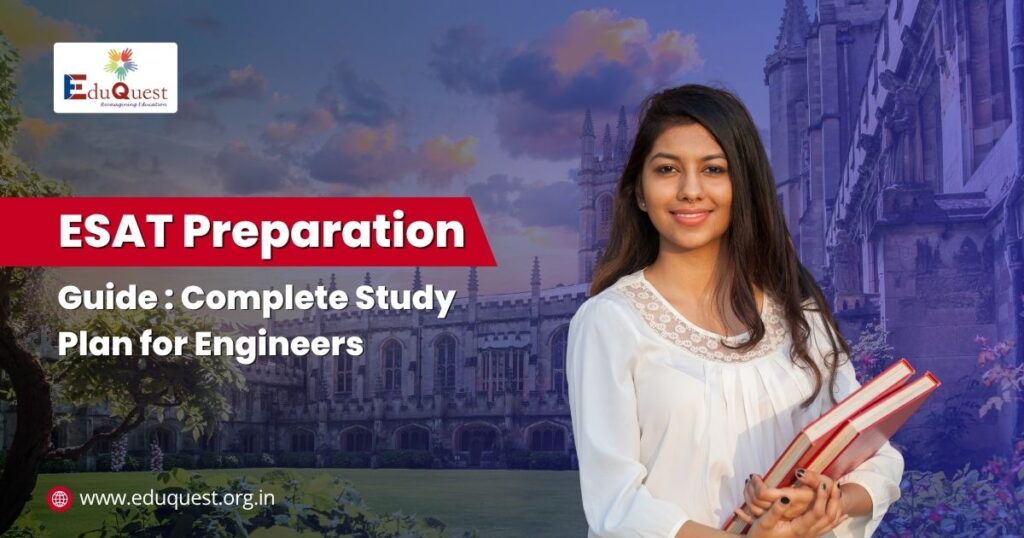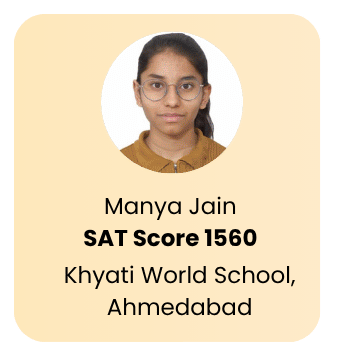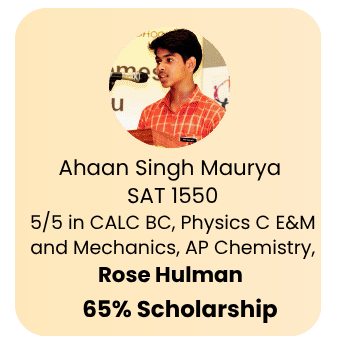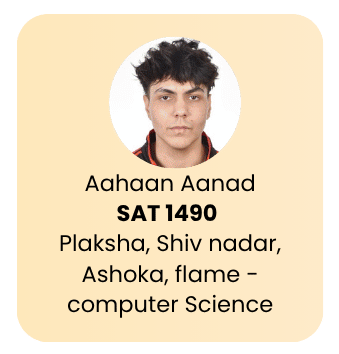Are you dreaming of studying engineering at Cambridge, Imperial College, or other prestigious UK universities? Your journey begins with mastering the Engineering Science Admissions Test (ESAT). This comprehensive ESAT preparation guide is designed specifically for ambitious engineering aspirants who refuse to settle for anything less than excellence.
If you’re feeling overwhelmed by the complexity of UK engineering entrance exams, you’re not alone. Many Indian students struggle with understanding what the ESAT actually tests, how it differs from familiar exams like JEE, and what preparation strategies actually work for securing admission to top engineering programs.
This complete ESAT study guide will transform your approach from confusion to confidence. We’ll break down everything from the ESAT syllabus engineering focus to advanced technical problem solving abilities that will set you apart from thousands of other engineering candidates. By the end, you’ll have a clear roadmap to excel in this critical engineering university admission test.
Understanding ESAT: Your Gateway to UK Engineering Excellence
What Is the ESAT Test for Engineering Admissions?
The Engineering Science Admissions Test (ESAT) is a specialized science and engineering aptitude test designed to assess your potential for success in engineering programs at top UK universities. Unlike traditional engineering entrance exams, the ESAT focuses on scientific reasoning assessment and mathematical reasoning for engineers rather than extensive curriculum knowledge.
Key ESAT Characteristics:
- Computer-based format administered through Pearson VUE
- Duration: Approximately 2 hours
- Question types: Multiple-choice questions
- Calculator: Not permitted
- Focus areas: Mathematics, Physics, and Chemistry
The ESAT represents a shift toward evaluating technical problem solving abilities and analytical thinking rather than memorization of formulas and facts.
Which UK Universities Require ESAT for Engineering Courses?
Understanding engineering course selection UK requirements is crucial for strategic planning. Here are the major universities requiring ESAT:
Universities Requiring ESAT for Engineering:
University of Cambridge:
- Engineering (all specializations)
- Natural Sciences (Physics, Chemistry tracks leading to engineering)
- Computer Science (some programs)
Imperial College London:
- Mechanical Engineering
- Electrical and Electronic Engineering
- Chemical Engineering
- Civil Engineering
- Materials Science and Engineering
University College London (UCL):
- Engineering programs (various specializations)
- Computer Science (selected programs)
Durham University:
- Engineering (various disciplines)
- Natural Sciences with engineering focus
Each university has specific ESAT score requirements engineering programs, making targeted preparation essential.
ESAT Test Dates and Registration for Engineering Students
When Are ESAT Test Dates for 2025 Engineering Admissions?
The ESAT test dates 2025 engineering schedule is critical for your application timeline:
Test Sitting 1 (Mandatory for Cambridge):
- Dates: October 9-10, 2025
- Registration Deadline: Early September 2025
- Target Audience: Cambridge engineering applicants (compulsory)
Test Sitting 2 (All universities except Cambridge):
- Dates: January 6-7, 2026
- Registration Deadline: Early December 2025
- Target Audience: Imperial, UCL, Durham engineering applicants
Critical Note: Cambridge engineering aspirants must take the October sitting. Missing this deadline means automatic application rejection.
How Can I Register for ESAT Test from India?
The ESAT registration process India is straightforward but requires careful attention to deadlines:
Step-by-Step Registration Process:
- Visit the official ESAT website
- Create a Pearson VUE account
- Select your preferred test date and location
- Choose from available ESAT test centers India
- Pay the registration fee (approximately £75)
- Receive confirmation and test center details
Major ESAT Test Centers in India:
- Delhi NCR: Gurgaon, Noida, Delhi
- Mumbai: Multiple locations
- Bangalore: Tech-friendly locations
- Chennai: Central locations
- Pune: Easily accessible centers
- Hyderabad: Multiple options
Early registration is crucial as engineering-focused test centers fill up quickly in metro cities.
Mastering the ESAT Syllabus: Engineering Focus
What Subjects Are Covered in the ESAT Syllabus?
The ESAT syllabus engineering focus covers three core areas essential for engineering success:
ESAT Mathematics Preparation for Engineers
Core Mathematical Topics:
- Algebra and Functions: Advanced algebraic manipulation, polynomial functions, exponential and logarithmic functions
- Calculus Fundamentals: Differentiation, integration basics, rates of change applications
- Coordinate Geometry: Analytical geometry, conic sections, transformations
- Trigonometry: Advanced identities, applications in engineering contexts
- Statistics and Probability: Data analysis, probability distributions, statistical inference
Engineering Applications Focus:
- Mathematical modeling of engineering problems
- Optimization techniques for engineering design
- Numerical methods and approximations
- Vector mathematics for engineering applications
ESAT Physics Preparation Guide for Engineering Students
Essential Physics Topics:
- Mechanics: Kinematics, dynamics, energy, momentum, rotational motion
- Electricity and Magnetism: Electric fields, magnetic fields, electromagnetic induction
- Waves and Oscillations: Simple harmonic motion, wave properties, sound waves
- Thermal Physics: Heat transfer, thermodynamics principles, gas laws
- Modern Physics: Atomic structure, radioactivity, quantum concepts
Engineering Context Integration:
- Applied physics concepts in engineering design
- Physics problem solving skills for real-world engineering challenges
- Understanding physical principles behind engineering systems
- Energy analysis in engineering applications
ESAT Chemistry Topics Coverage for Engineers
Key Chemistry Areas:
- Atomic Structure: Electronic configuration, periodic trends, chemical bonding
- Chemical Reactions: Stoichiometry, reaction kinetics, equilibrium
- Organic Chemistry: Basic organic compounds, functional groups, reactions
- Physical Chemistry: Thermodynamics, electrochemistry, phase changes
- Inorganic Chemistry: Properties of elements, compounds, coordination chemistry
Engineering Applications:
- Chemical engineering fundamentals understanding
- Materials science applications
- Environmental engineering chemistry
- Energy conversion and storage chemistry
Strategic ESAT Test Preparation for Engineers
How Early Should I Start Preparing for ESAT?
Effective ESAT test preparation for engineers requires strategic timeline planning:
6-Month Comprehensive Plan:
- Months 1-2: Foundation review and gap identification
- Months 3-4: ESAT mock tests engineering introduction
- Months 5-6: Intensive practice and performance optimization
3-Month Intensive Plan:
- Month 1: Rapid concept review and ESAT difficulty level analysis
- Month 2: Daily practice with ESAT past papers with solutions
- Month 3: Mock exams and test-taking strategy refinement
Starting early allows for thorough engineering mathematics preparation without the stress of cramming.
Essential Problem-Solving Strategies for Engineering Success
Technical Problem Solving Framework:
- Engineering Problem Analysis:
- Break complex problems into manageable components
- Identify relevant physical principles and mathematical concepts
- Apply systematic approaches to unfamiliar scenarios
- Mathematical Reasoning Application:
- Use dimensional analysis to check solution validity
- Apply approximation techniques for quick calculations
- Develop mental math skills for calculator-free environment
- Scientific Method Integration:
- Formulate hypotheses for problem-solving approaches
- Test solutions through logical reasoning
- Verify answers using alternative methods
Can I Use a Calculator in the ESAT Test?
No, calculators are not permitted in the ESAT test. This policy is designed to test your mathematical reasoning for engineers rather than computational skills. This means you need to:
- Develop strong mental arithmetic abilities
- Master estimation and approximation techniques
- Practice algebraic manipulation without computational aids
- Use mathematical shortcuts and pattern recognition
This calculator-free approach actually benefits engineering students by emphasizing understanding over computation.
University-Specific ESAT Requirements for Engineers
What Is a Good ESAT Score for Cambridge Engineering?
Cambridge ESAT engineering admission standards are among the most demanding globally:
Cambridge Engineering Score Benchmarks:
- Competitive Score: 6.0+ (out of 9.0)
- Strong Candidate: 6.5+
- Exceptional Performance: 7.0+
Cambridge Engineering Evaluation Process:
- ESAT score (significant weight)
- A-level predictions or equivalent
- Personal statement quality
- Interview performance
- Subject-specific assessments
Cambridge uses a holistic approach, but strong ESAT performance is essential for interview invitation.
Imperial College ESAT Requirements for Engineering
Imperial College ESAT requirements vary by engineering discipline:
Imperial College Score Expectations:
- Mechanical Engineering: 6.0+ typically required
- Electrical Engineering: 6.0-6.5 competitive range
- Chemical Engineering: 6.0+ with strong chemistry performance
- Civil Engineering: 5.5-6.0 competitive range
Imperial College Evaluation Factors:
- ESAT performance in relevant subject areas
- A-level grades in mathematics and sciences
- Personal statement alignment with chosen engineering field
- Relevant work experience or projects
UCL Engineering ESAT Test Strategy
UCL engineering admission ESAT preparation should emphasize:
- Consistent performance across all three subject areas
- Strong mathematical reasoning demonstration
- Applied problem-solving skills showcase
- Integration of theoretical knowledge with practical applications
UCL Engineering Score Indicators:
- Computer Science: 6.0+ competitive
- Engineering programs: 5.5-6.0 range
- Interdisciplinary programs: 5.5+ typically sufficient
Effective ESAT Preparation Resources for Engineers
Best ESAT Preparation Books Engineering Focus
Essential Study Materials:
- Official ESAT Specification (Free download from admissions testing website)
- Cambridge University Press ESAT preparation guides
- Advanced Engineering Mathematics by Kreyszig (for mathematical concepts)
- University Physics by Young & Freedman (for physics preparation)
- Organic Chemistry by Clayden (for chemistry concepts)
Engineering-Specific Resources:
- ESAT past papers engineering focus (official website)
- Engineering problem-solving workbooks
- Applied mathematics for engineering textbooks
- Physics for engineers specialized materials
ESAT Online Coaching Classes vs. Self-Study for Engineers
Benefits of ESAT Online Coaching Classes:
- Expert guidance on engineering admissions test UK strategies
- Regular ESAT mock tests engineering with detailed feedback
- Peer learning with other engineering aspirants
- Structured curriculum covering all ESAT topics systematically
- Technical aptitude evaluation and improvement tracking
Self-Study Advantages for Engineers:
- Flexible pacing according to individual engineering interests
- Cost-effective preparation approach
- Ability to focus on specific engineering applications
- Independence in learning style adaptation
- Integration with regular engineering coursework
Recommended Hybrid Approach: Combine professional coaching for guidance with intensive self-study for engineering-specific applications.
Advanced ESAT Preparation Strategies for Engineers
ESAT vs JEE Comparison: Understanding the Difference
Many Indian engineering students wonder about ESAT vs other engineering tests comparison:
ESAT Characteristics:
- Reasoning-based assessment
- Multiple-choice format
- No calculator permitted
- Emphasis on applied problem-solving
- International engineering context
JEE Characteristics:
- Curriculum-based extensive syllabus
- Computational complexity emphasis
- Calculator permitted in some sections
- Indian engineering education focus
- Highly competitive numerical scoring
Key Preparation Differences:
- ESAT requires analytical thinking over extensive practice
- Focus on conceptual understanding rather than problem patterns
- English proficiency important for question comprehension
- International perspective on engineering applications
Engineering-Specific ESAT Preparation Strategies
Mechanical Engineering ESAT Preparation:
- Emphasize mechanics and thermodynamics
- Focus on applied physics concepts in mechanical systems
- Practice problems involving forces, energy, and motion
- Understand material properties and engineering applications
Electrical Engineering ESAT Topics:
- Strong emphasis on electricity and magnetism
- Circuit analysis and electromagnetic principles
- Mathematical modeling of electrical systems
- Physics problem solving skills in electrical contexts
Chemical Engineering ESAT Syllabus:
- Comprehensive chemistry preparation
- Chemical engineering fundamentals understanding
- Thermodynamics and reaction kinetics
- Materials science applications
Computer Engineering ESAT Requirements:
- Strong mathematical reasoning skills
- Logic and computational thinking
- Mathematical reasoning for engineers in computing contexts
- Understanding of digital systems principles
Overcoming Common ESAT Preparation Challenges
How Difficult Is the ESAT Engineering Admission Test?
The ESAT difficulty level analysis reveals several challenging aspects:
Challenging Elements:
- Time pressure with complex reasoning questions
- No calculator requirement for mathematical calculations
- Unfamiliar question formats compared to Indian engineering exams
- Integration of multiple subject areas in single problems
Manageable Aspects:
- Multiple-choice format provides answer options
- Syllabus based on familiar A-level/12th standard topics
- Practice significantly improves performance
- Reasoning skills can be systematically developed
Success Factors:
- Consistent daily practice over several months
- Focus on conceptual understanding over memorization
- Regular mock test performance analysis and improvement
- Professional guidance for challenging topics
Can I Retake ESAT If I Score Poorly?
Yes, ESAT retake policies allow multiple attempts:
- Maximum two attempts per academic year
- Universities typically consider your highest score
- Retaking demonstrates commitment to improvement
- Plan retakes carefully considering application deadlines
Retake Strategy for Engineers:
- Analyze previous performance thoroughly
- Focus on engineering-specific weak areas
- Consider specialized ESAT coaching for engineering students
- Ensure adequate preparation time before retaking
ESAT Success Stories and Engineering Career Prospects
Real Results from Indian Engineering Students
Many Indian students have successfully used strong ESAT performance to secure admissions at top UK engineering programs:
Success Factors:
- Systematic preparation starting 6+ months early
- Engineering-focused study approach aligned with career goals
- Regular practice with official ESAT materials
- Professional guidance when needed for challenging concepts
Inspiring Outcomes:
- Cambridge Engineering admits with ESAT scores of 6.5+
- Imperial College students who improved from 5.0 to 6.5 through strategic preparation
- UCL engineering admits who balanced ESAT prep with A-level studies
Engineering Scholarship Preparation Through ESAT
Strong ESAT performance significantly enhances engineering scholarship preparation prospects:
Scholarship Opportunities:
- Merit-based awards for exceptional ESAT performers
- Engineering-specific scholarships at UK universities
- Research assistantships for high-achieving students
- Industry partnerships offering financial support
Scholarship Strategy:
- Target ESAT scores above 6.5 for maximum scholarship impact
- Combine strong ESAT performance with excellent A-level grades
- Research university-specific and engineering-discipline scholarships
- Apply early for best scholarship consideration
Financial Considerations and Investment in Engineering Future
How Much Does the ESAT Test Cost for Indian Students?
ESAT Test Investment:
- Registration Fee: £75 (approximately ₹7,500)
- Test Center Fees: Included in registration
- Preparation Costs: Variable based on chosen approach
Additional Preparation Investment:
- ESAT preparation books engineering: ₹3,000-6,000
- Online coaching classes: ₹20,000-60,000
- Mock test series: ₹5,000-10,000
- Private tutoring: ₹15,000-40,000
Return on Investment: Strong ESAT performance can lead to:
- Admission to prestigious engineering programs
- Scholarship opportunities worth £10,000-50,000+
- Enhanced career prospects in engineering
- Access to world-class engineering education and research
Conclusion: Your Path to Engineering Excellence Through ESAT
Mastering the ESAT preparation guide process is your gateway to joining the next generation of world-class engineers. The journey requires dedication, strategic planning, and consistent effort, but the rewards—admission to prestigious UK engineering programs and access to cutting-edge engineering education—make this investment worthwhile.
Key Takeaways for ESAT Engineering Success:
- Start preparation at least 6 months before your test date
- Focus on scientific reasoning assessment and technical problem solving abilities
- Practice regularly with ESAT mock tests engineering materials
- Understand university-specific ESAT score requirements engineering programs
- Develop strong mathematical reasoning for engineers without calculator dependence
Remember, the ESAT isn’t just about testing your current knowledge—it’s about demonstrating your potential to excel in university-level engineering programs. With proper preparation and the right mindset, you can achieve the scores needed for your dream engineering program.
Ready to begin your engineering journey? Start with a comprehensive assessment of your current strengths and weaknesses, create a structured study plan focusing on engineering mathematics preparation, and commit to consistent daily practice. Your future as an engineer at a top UK university begins with the preparation choices you make today.
The path to engineering excellence through UK engineering entrance exams starts now. Take the first step, and transform your engineering aspirations into measurable success on the ESAT.
FAQs
How does ESAT preparation differ from preparing for Indian engineering entrance exams like JEE?
ESAT preparation emphasizes scientific reasoning assessment and analytical thinking over extensive problem-solving practice. Unlike JEE’s curriculum-heavy approach, ESAT focuses on mathematical reasoning for engineers and applied physics concepts without calculators. The engineering science admissions test prep requires understanding fundamental principles deeply rather than memorizing numerous formulas and problem patterns. ESAT questions integrate multiple subjects and test your ability to apply technical problem solving abilities to unfamiliar scenarios, making conceptual clarity more important than speed and computational skills.
Which engineering disciplines have the highest ESAT score requirements at top UK universities?
Cambridge ESAT engineering admission typically requires the highest scores across all disciplines, with 6.5+ being competitive for most engineering programs. Imperial College ESAT requirements vary by discipline: Electrical and Electronic Engineering often requires 6.5+, while Mechanical Engineering may accept 6.0+. Computer Engineering ESAT requirements at top universities typically demand 6.0-6.5 due to high competition. Chemical engineering fundamentals programs often require strong chemistry performance alongside overall scores of 6.0+. Aerospace engineering requirements and biomedical engineering tests typically have similar benchmarks due to their specialized nature.
Can I effectively prepare for ESAT while managing my regular 12th-grade studies and other commitments?
Yes, effective ESAT test preparation for engineers can be balanced with regular studies through strategic time management. Dedicate 1-2 hours daily to ESAT prep while maintaining your core subjects, as strong A-level/12th grades remain crucial for UK engineering entrance exams. Use engineering mathematics preparation from ESAT to reinforce your regular math coursework. Schedule intensive ESAT mock tests engineering sessions on weekends to avoid interfering with school commitments. The key is starting 6 months early to avoid cramming and utilizing ESAT past papers with solutions that align with your current curriculum topics.
What are the most effective resources for engineering-focused ESAT preparation available to Indian students?
ESAT preparation books engineering should include official specification documents (free), Cambridge University Press guides, and engineering-focused textbooks like Kreyszig’s Advanced Engineering Mathematics. Online ESAT preparation courses specifically designed for engineering university admission tests offer structured learning paths. Utilize ESAT past papers engineering focus from the official website, supplemented by physics problem solving skills resources like University Physics by Young & Freedman. ESAT coaching for engineering students through reputable Indian institutes provides personalized guidance, while free resources like Khan Academy can reinforce applied physics concepts and mathematical reasoning.
How important is the ESAT score compared to other factors in UK engineering admissions?
The ESAT score requirements engineering programs vary by university, but it’s typically a significant factor in admission decisions. Cambridge engineering ESAT requirements 2025 make ESAT performance crucial for interview invitations, often comprising 20-30% of the initial selection criteria. Imperial College ESAT cut off scores are used alongside A-level predictions and personal statements for holistic evaluation. However, universities also consider academic grades (40-50% weight), personal statements showcasing engineering passion, reference letters, and interview performance where applicable. Strong ESAT scores can compensate for slightly lower predicted grades, while exceptional A-level performance might offset moderate ESAT scores, making balanced preparation across all components essential.













